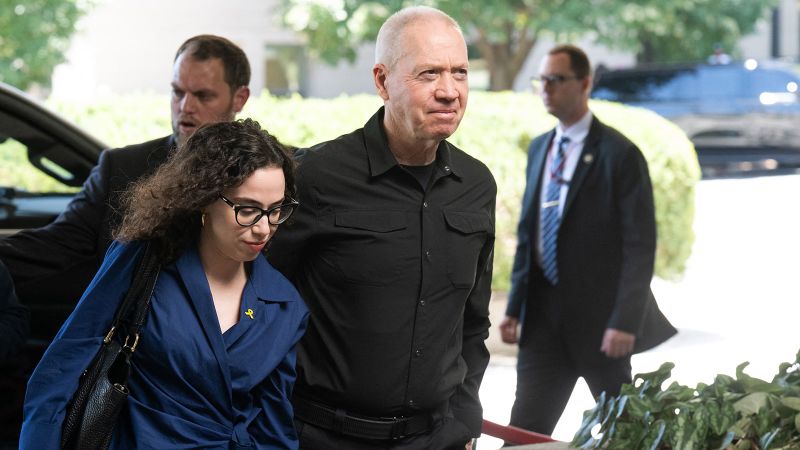Washington
CNN
—
American officials hope to gain a better understanding of Israel’s war plans in meetings this week with Israel’s defense minister, who arrived in Washington as the rift between the Biden administration and Prime Minister Benjamin Netanyahu deepened.
Yoav Gallant has emerged as a key interlocutor for Biden’s advisers as the war in Gaza continues. Administration officials expressed hope that the talks could lead to more clarity on Israel’s plans after Netanyahu made ambiguous statements about ending the war over the weekend.
On Sunday, Netanyahu said in an interview with a conservative television channel in Israel that he was ready to agree to a temporary cessation of fighting in exchange for the release of some hostages in the Gaza Strip, while reiterating his position that the war would continue even after a ceasefire “to achieve the goal of annihilation” of Hamas.
This seemed to contradict the US-backed Israeli proposal to release the hostages, which would ultimately lead to a permanent ceasefire.
A day later, Netanyahu reiterated his claim that the war would not end until all hostages were returned, but stressed that he would not back down from the ceasefire proposal supported by Biden.
“We will not end the war until we return all our hostages – 120 hostages, the living and the dead. We stand by the Israeli proposal, which President Biden welcomed. Our position has not changed,” he said in the Knesset plenum on Monday.
The two different answers – delivered to two different audiences – reflected the kind of ambiguity from Netanyahu that has frustrated some Biden officials in their efforts to end the fighting in Gaza.
His comments threaten to further strain relations with the United States, which has actively mobilized international support for the proposal and sought to broker an agreement.
Netanyahu said that when the “intense phase” of the Gaza conflict is over, Israel will continue to “mow the grass” in Gaza, something U.S. officials oppose.
“I don’t know exactly what he means by that, but I think it probably means continued military engagement in Gaza. And to us, that’s just a recipe for continued conflict, continued instability and continued insecurity for Israel,” State Department spokesman Matt Miller said on Monday, adding that continued military engagement would “extremely harm the people of Gaza and weaken Israel.”
In the interview, Netanyahu also said that Israel would enter a new phase of fighting. This could be a harbinger of Israel sending more troops to the northern border with Lebanon in the fight against Hezbollah fighters.
At meetings this week, U.S. officials will turn to Gallant to gain a better understanding of how Israel is moving into a new phase of the conflict and what its plans are in the north.
Gallant spoke with CIA Director Bill Burns and U.S. envoy Amos Hochstein about a “Phase C” of Israeli operations in Gaza, which an Israeli official described as a less intense, more precise phase of the war. The official said Phase C was not a discussion of a “day-after plan” for Gaza, a point on which Netanyahu has declined to comment. Last month, Gallant said he had repeatedly raised the subject of postwar plans for Gaza and the need for an alternative to Hamas in Cabinet meetings, but “the issue was not raised for debate.”
Gallant had called on Netanyahu to declare that Israel would not establish civilian or military control over Gaza. But Netanyahu ignored his defense minister’s request and refused to make such a public statement.
And former Defense Minister Benny Gantz, who resigned from the unity government with Netanyahu two weeks ago, accused Israel’s longest-serving leader of putting political considerations above a post-war strategy.
US officials are also frustrated and are now waiting for Israel to present plans for the post-war government in Gaza and the reconstruction of the destroyed enclave. Rising tensions on the Israeli-Lebanese border have only complicated the situation.
Although US officials did not explicitly tell Israel that they opposed any attack on Hezbollah, they warned Israel that the Israelis’ actions could lead to a larger war that both sides did not actually want, a US official said.
Gallant’s meetings this week with senior officials, including Defense Secretary Lloyd Austin, Secretary of State Antony Blinken and National Security Advisor Jake Sullivan, come after Netanyahu claimed the U.S. was withholding arms sales to Israel.
Gallant remained silent as he left the State Department on Monday afternoon after a lengthy meeting with Blinken. Miller said Monday that during the meeting the U.S. would “try to make progress on a number of issues,” including day-after plans for Gaza and containing further escalation of the conflict.
White House officials dismissed some of Netanyahu’s comments as politically motivated as he seeks to maintain his position of power, but they nonetheless caused deep frustration in the White House.
The White House said last week that it had no idea what Netanyahu was talking about and called his claims “annoying, disappointing and inaccurate.” Then at the weekend it said it would not engage in a lengthy exchange of blows with Netanyahu.
“We have repeatedly made our position clear on this and will not respond further to the Prime Minister’s policy statements,” a White House official said. “We look forward to constructive consultations with the Secretary of Defense in Washington this week.”
Still, Miller responded to Netanyahu’s weekend comments during the State Department’s daily press conference on Monday, saying, “Those of us who speak publicly sometimes slip up, and when that happens, we have an obligation to clarify that, and we’re glad he did that.”
As he departed for Washington, Gallant reiterated the importance of Israel’s relations with Washington.
“The United States is our most important and central ally. Our relationship is critical and perhaps more important than ever at this time,” Gallant told reporters before leaving Israel, according to an Israeli Defense Ministry statement on Sunday.




